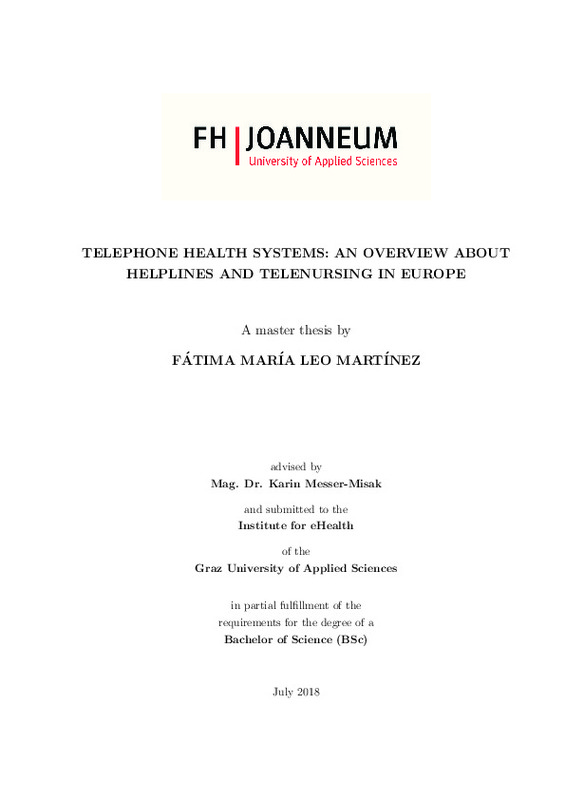|
Resumen:
|
[EN] Global health management is being overwhelmed by both health care and economic, and
quality aspects of health care. This is due to a number of factors, including the rising
incidence of chronic diseases, an ageing ...[+]
[EN] Global health management is being overwhelmed by both health care and economic, and
quality aspects of health care. This is due to a number of factors, including the rising
incidence of chronic diseases, an ageing population and austerity of public spending by
some countries and states. Therefore, the use of information technologies in health is
necessary to maintain the sustainability of existing health systems, while at the same
time enabling governments to make financial savings. An example of this is the health
telephone lines, which provide self-care and health advice to patients outside working
hours, regulate patient access to health care, and reduce unnecessary demand for services.
Many countries in Europe have opted for these systems, and Austria is one of them since
the implementation of pilot systems for this service in several regions of the country a year
ago. Thus, the aim of this paper will be to analyse not only the benefits that these systems
can bring, but also the necessary conditions required for successful implementation, the
disadvantages that may arise, and the dilemmas and challenges posed by the use of this
type of telemedicine service. In addition, the different types of organisations involved in
this service in Europe will be studied, as well as the possible restrictions and the goals
obtained by each of them. Finally, the possibility of improving this type of service through
the incorporation of video teleconferencing will be observed.
[-]
[ES] El problema del hacinamiento en los servicios de urgencias hospitalarios es un problema global que tiene consecuencias negativas para la calidad de la atención y la eficiencia de los sistemas sanitarios, así como para ...[+]
[ES] El problema del hacinamiento en los servicios de urgencias hospitalarios es un problema global que tiene consecuencias negativas para la calidad de la atención y la eficiencia de los sistemas sanitarios, así como para la economía de los países. El concepto de la enfermería telefónica, nace con el objetivo de apoyar, fortalecer y enseñar a las personas que llaman, al mismo tiempo que se las deriva hacia el nivel apropiado de atención, lidiando con el exceso de pacientes y mejorando la gestión de los recursos sanitarios.
Al introducir un nuevo tipo de servicio de salud, como una línea telefónica de ayuda sanitaria, es importante investigar y aprender de los problemas que podrían afectar a la seguridad de los pacientes, así como de los posibles retos, vulnerabilidades e inconvenientes que pueden derivarse del uso de la tele-enfermería, y que no pueden ignorarse para el buen funcionamiento del servicio. De esta forma, y con motivo de la implantación de un sistema piloto en Austria, se analizarán artículos y estudios realizados en los países de Europa donde ya se ha desarrollado este servicio, con el objetivo de definir cuáles son las mejores opciones a la hora de ejercer la tele-enfermería, o las que pueden conseguir un mayor rendimiento del servicio. Además, se presentarán posibles pasos para el desarrollo de estos sistemas.
[-]
[DE] Das globale Gesundheitsmanagement wird sowohl von der Gesundheitsversorgung als auch
von wirtschaftlichen und qualitativen Aspekten der Gesundheitsversorgung ¨uberfordert.
Dies ist auf eine Reihe von Faktoren ...[+]
[DE] Das globale Gesundheitsmanagement wird sowohl von der Gesundheitsversorgung als auch
von wirtschaftlichen und qualitativen Aspekten der Gesundheitsversorgung ¨uberfordert.
Dies ist auf eine Reihe von Faktoren zur¨uckzuf¨uhren, darunter die zunehmende Zunahme chronischer Krankheiten, die Alterung der Bev¨olkerung und die Sparsamkeit der
¨offentlichen Ausgaben einiger L¨ander und Staaten. Daher ist der Einsatz von Informationstechnologien im Gesundheitswesen notwendig, um die Nachhaltigkeit der bestehenden
Gesundheitssysteme zu erhalten und gleichzeitig den Regierungen finanzielle Einsparungen zu erm¨oglichen. Ein Beispiel daf¨ur sind die Gesundheitstelefonleitungen, die den Patienten außerhalb der Arbeitszeiten Selbstversorgung und Gesundheitsberatung bieten,
den Zugang der Patienten zu und den Fluss der Gesundheitsversorgung regeln und die
unn¨otige Nachfrage nach Dienstleistungen reduzieren. Viele L¨ander in Europa haben sich
f¨ur diese Systeme entschieden, und Osterreich geh¨ort seit der Einf¨uhrung von Pilotan- ¨
lagen f¨ur diesen Dienst in mehreren Regionen des Landes vor einem Jahr dazu. Ziel
dieses Papiers ist es daher, nicht nur den Nutzen dieser Systeme zu analysieren, sondern
auch die notwendigen Voraussetzungen f¨ur eine erfolgreiche Umsetzung, die Nachteile,
die sich daraus ergeben k¨onnen, sowie die Dilemmata und Herausforderungen, die mit
der Nutzung dieser Art von Telemedizin verbunden sind. Dar¨uber hinaus werden die
verschiedenen Arten von Organisationen, die an diesem Dienst in Europa beteiligt sind,
sowie die m¨oglichen Einschr¨ankungen und die von jedem von ihnen erreichten Ziele untersucht. Schließlich wird die M¨oglichkeit der Verbesserung dieser Art von Dienst durch
die Einbeziehung von Video-Telekonferenzen beobachtet werden.
[-]
|







